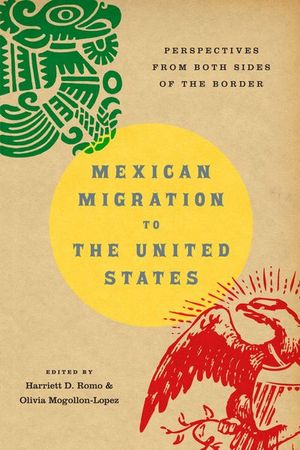Mexican Migration to the United States
Published by University of Texas Press
This anthology examining borderlands migration brings together the perspectives of Mexican and US scholars from a variety of fields.
Gathering a transnational group of prominent researchers, including leading Mexican scholars whose work is not readily available in the United States, this collection brings together an array of often-overlooked viewpoints, reflecting the interconnectedness of immigration policy. These essays reveal significant aspects of labor markets, family life, and educational processes. They capture the evolving legal frameworks and economic implications of Mexico-US migrations at the national and municipal levels, as well as the experiences of receiving communities in the United States.
The volume includes illuminating reports on populations ranging from undocumented young adults to elite Mexican women immigrants, health-care rights, Mexico’s incorporation of return migration, the impact of Deferred Action for Childhood Arrivals on higher education, and the experiences of young children returning to Mexican schools after living in the United States.
Reflecting a multidisciplinary approach, the list of contributors includes anthropologists, demographers, economists, educators, policy analysts, and sociologists. Underscoring the fact that Mexican migration to the United States is unique and complex, this timely work exemplifies the cross-border collaboration crucial to the development of immigration policies that serve people in both countries.
Gathering a transnational group of prominent researchers, including leading Mexican scholars whose work is not readily available in the United States, this collection brings together an array of often-overlooked viewpoints, reflecting the interconnectedness of immigration policy. These essays reveal significant aspects of labor markets, family life, and educational processes. They capture the evolving legal frameworks and economic implications of Mexico-US migrations at the national and municipal levels, as well as the experiences of receiving communities in the United States.
The volume includes illuminating reports on populations ranging from undocumented young adults to elite Mexican women immigrants, health-care rights, Mexico’s incorporation of return migration, the impact of Deferred Action for Childhood Arrivals on higher education, and the experiences of young children returning to Mexican schools after living in the United States.
Reflecting a multidisciplinary approach, the list of contributors includes anthropologists, demographers, economists, educators, policy analysts, and sociologists. Underscoring the fact that Mexican migration to the United States is unique and complex, this timely work exemplifies the cross-border collaboration crucial to the development of immigration policies that serve people in both countries.
BUY NOW FROM
COMMUNITY REVIEWS

